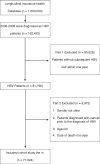Cancer risk in HBV patients with statin and metformin use: a population-based cohort study
- PMID: 25674734
- PMCID: PMC4602747
- DOI: 10.1097/MD.0000000000000462
Cancer risk in HBV patients with statin and metformin use: a population-based cohort study
Abstract
Chronic infection with hepatitis B virus (HBV) often causes chronic inflammation of the liver with an increased incidence of hepatocellular carcinoma (HCC). HBV-infected individuals may also have an increased incidence of nonliver cancers. Taking statin or metformin may decrease inflammation and infiltration, which may, as a result, reduce the risk of liver cancer or other major cancers in patients with HBV infection. The purpose of this study was to evaluate the hypothesis that statin and metformin could reduce the incidence of liver cancer (HCC) or nonliver cancers in patients with HBV.Using the Taiwan Longitudinal Health Insurance Database 2000 to 2008, this cohort study comprised patients with a recorded diagnosis of HBV (N = 71,847) between January 1, 2000 and December 31, 2008. Each patient was followed-up until the end of 2008. The occurrence of HCC or a nonliver cancer was evaluated in patients who either were or were not taking statin or metformin. Cox proportional hazard regressions were used to evaluate the cancer incidence after adjusting for known confounding factors.In total, 71,824 HBV-infected patients comprised the study cohort. Our study showed that either metformin or statin use was associated with a reduction in the incidence of cancer. This was most prominent in patients taking both statin and metformin. The adjusted hazard ratios (HRs) for patients using only statin were 0.52 (95% confidence interval [CI], 0.48-0.57) for all cancers, 0.28 (95% CI, 0.23-0.35) for liver cancer, and 0.63 (95% CI, 0.57-0.70) for nonliver cancers. Patients taking only metformin had risk-adjusted HRs of 0.82 (95% CI, 0.75-0.90) for all cancers, 0.97 (95% CI, 0.84-1.14) for liver cancer, and 0.75 (95% CI, 0.67-0.84) for nonliver cancers. A dose-dependent effect of statin use for chemoprevention was observed for all cancers, including both liver cancer and nonliver cancers. A dose-dependent effect of metformin was also seen in liver cancer and nonliver cancers without stratification into different cumulative daily doses of statin use.This population-based cohort study investigated the protective effect of statin and metformin against cancer events in patients with HBV infection. Our study demonstrated that either statin or metformin served as independent chemopreventive agents with a dose-response effect in reducing the incidence of cancer with a dose-response effect of the agents and an additive or synergistic effect of combining statin and metformin use in reducing the incidence of many cancers.
Conflict of interest statement
The authors have no conflicts of interest to disclose.
Figures
Similar articles
-
Statins and the risk of hepatocellular carcinoma in patients with hepatitis B virus infection.J Clin Oncol. 2012 Feb 20;30(6):623-30. doi: 10.1200/JCO.2011.36.0917. Epub 2012 Jan 23. J Clin Oncol. 2012. PMID: 22271485
-
Statin Use and the Risk of Hepatocellular Carcinoma in Patients With Chronic Hepatitis B.Hepatology. 2020 Jun;71(6):2023-2032. doi: 10.1002/hep.30973. Epub 2020 Feb 14. Hepatology. 2020. PMID: 31556128
-
Statin and the risk of hepatocellular carcinoma and death in a hospital-based hepatitis B-infected population: A propensity score landmark analysis.J Hepatol. 2015 Nov;63(5):1190-7. doi: 10.1016/j.jhep.2015.07.009. Epub 2015 Jul 21. J Hepatol. 2015. PMID: 26208777
-
Meta-analysis: Chemoprevention of hepatocellular carcinoma with statins, aspirin and metformin.Aliment Pharmacol Ther. 2023 Mar;57(6):600-609. doi: 10.1111/apt.17371. Epub 2023 Jan 10. Aliment Pharmacol Ther. 2023. PMID: 36625733 Free PMC article. Review.
-
Metformin in the prevention of hepatocellular carcinoma in diabetic patients: A systematic review.Ann Hepatol. 2020 May-Jun;19(3):232-237. doi: 10.1016/j.aohep.2019.10.005. Epub 2019 Nov 28. Ann Hepatol. 2020. PMID: 31836424
Cited by
-
KASL clinical practice guidelines for management of chronic hepatitis B.Clin Mol Hepatol. 2019 Jun;25(2):93-159. doi: 10.3350/cmh.2019.1002. Epub 2019 Jun 12. Clin Mol Hepatol. 2019. PMID: 31185710 Free PMC article. Review. No abstract available.
-
Statin Use and the Risk of Hepatocellular Carcinoma: A Meta-Analysis of Observational Studies.Cancers (Basel). 2020 Mar 13;12(3):671. doi: 10.3390/cancers12030671. Cancers (Basel). 2020. PMID: 32183029 Free PMC article. Review.
-
The Use of Statins in Patients With Chronic Liver Disease and Cirrhosis.Curr Treat Options Gastroenterol. 2018 Jun;16(2):226-240. doi: 10.1007/s11938-018-0180-4. Curr Treat Options Gastroenterol. 2018. PMID: 29572618 Review.
-
Meta-analysis of studies using statins as a reducer for primary liver cancer risk.Sci Rep. 2016 May 20;6:26256. doi: 10.1038/srep26256. Sci Rep. 2016. PMID: 27198922 Free PMC article.
-
Predictive and preventive significance of AMPK activation on hepatocarcinogenesis in patients with liver cirrhosis.Cell Death Dis. 2018 Feb 15;9(3):264. doi: 10.1038/s41419-018-0308-4. Cell Death Dis. 2018. PMID: 29449537 Free PMC article.
References
-
- Chen G, Lin W, Shen F, et al. Chronic hepatitis B virus infection and mortality from non-liver causes: results from the Haimen City cohort study. Int J Epidemiol 2005; 34:132–137. - PubMed
-
- Chan KK, Oza AM, Siu LL. The statins as anticancer agents. Clin Cancer Res 2003; 9:10–19. - PubMed
-
- Wong WW, Dimitroulakos J, Minden MD, et al. HMG-CoA reductase inhibitors and the malignant cell: the statin family of drugs as triggers of tumor-specific apoptosis. Leukemia 2002; 16:508–519. - PubMed
-
- Danesh FR, Sadeghi MM, Amro N, et al. 3-Hydroxy-3-methylglutaryl CoA reductase inhibitors prevent high glucose-induced proliferation of mesangial cells via modulation of Rho GTPase/p21 signaling pathway: implications for diabetic nephropathy. Proc Nat Acad Sci U S A 2002; 99:8301–8305. - PMC - PubMed
-
- Blanco-Colio LM, Munoz-Garcia B, Martin-Ventura JL, et al. 3-hydroxy-3-methylglutaryl coenzyme A reductase inhibitors decrease Fas ligand expression and cytotoxicity in activated human T lymphocytes. Circulation 2003; 23:1506–1513. - PubMed
Publication types
MeSH terms
Substances
LinkOut - more resources
Full Text Sources
Medical


